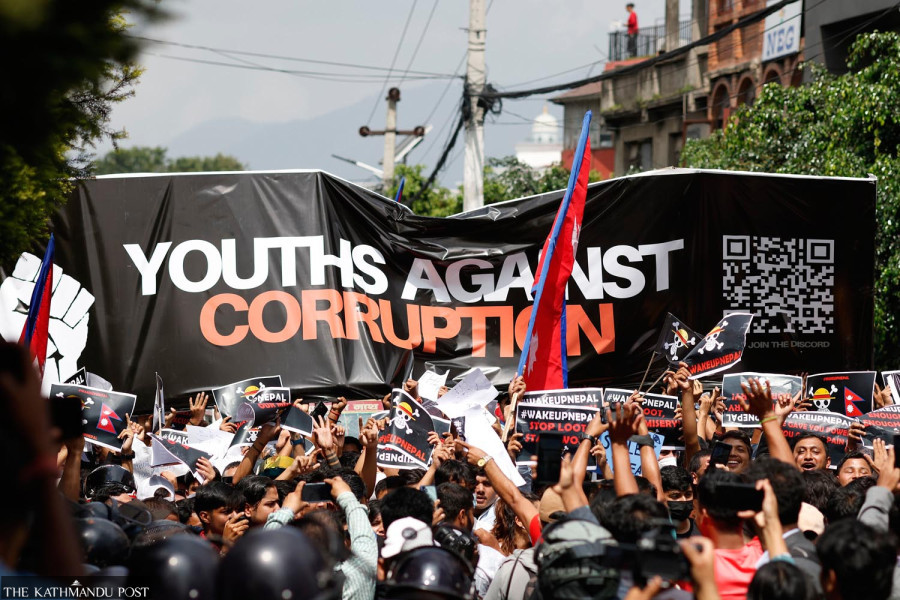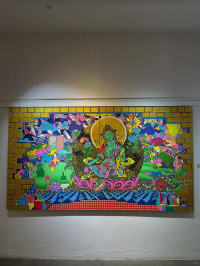Culture & Lifestyle
A hashtag that turned doomscrolling into solidarity
More than a month has passed since #Nepokids went viral, yet the conversation among Nepali youth around privilege, opportunity, and merit shows no signs of slowing.
Anish Ghimire
It started with a few videos—lavish parties, designer clothes, vacations abroad. Then came the comments: “Whose money is this?” Within days, doom-scrolling turned into solidarity, as young Nepalis called out privilege, corruption, and inequality under one sharp label—#Nepokids.
“The irony of privilege is it’s often invisible to those who have it, while its effects are deeply felt by those who don’t…” one Instagram user wrote. Nepali Gen Z, under the hashtag of #Nepokids, started an anti-corruption drive expressing how politicians, bureaucrats, and lawmakers are misusing taxpayers’ money to fund their children’s education and luxurious lives, which is often flaunted on social media.
The sentiment is not just academic, it’s lived. “Seeing these videos made me angry,” says 21-year-old student Smriti Shrestha from Lalitpur. “I work hard every day, and it feels unfair that some people get everything because of who their parents are. #Nepokids made me realise I’m not alone in feeling this.”
Similarly, 17-year-old Sanskar Pokharel from Itahari says the movement sparked conversations among his friends. “We started talking about why some people always seem to have a head start while others struggle to get noticed. It’s not just jealousy—it’s about fairness and opportunity.”
Psychologist Dipesh Tandukar says the reaction is rooted in a deep sense of inequality. “Many feel they’ve worked hard to reach their current stage, so when they see nepo kids, it feels unfair that they can access resources and opportunities simply because of their family background,” he explains.
Social comparison intensifies the emotions. “When we see people of our age succeed unfairly, it can make us question our own progress,” Tandukar says. Social media amplifies this effect, broadcasting private frustration to a public audience. But he also warns of the mental toll: constant exposure to outrage online can foster anxiety, anger, or hopelessness about one’s own chances of success.
While #Nepokids critiques inherited wealth, it also raises attention on what it means to succeed without privilege. Pranayna KC, CEO of Hivelaya, a learning platform that connects learners with instructors, built her company from scratch, without inside support. “Some people start from a different place, and that’s just reality. But what matters is what you do with what you have,” she says.
KC emphasises that effort, learning, and persistence can create opportunities even when the system favours the privileged. “Privilege exists, yes, but so does hard work. You can’t change where you start, but you can decide what you do with it,” she says.

She also highlights the broader implications for Nepali youth: the rise of conversations about privilege has made the public more critical, informed, and demanding of transparency, which benefits those working hard on their own merit. “People are now more aware and want authenticity. That’s a good thing—it keeps the industry honest. But it’s important not to assume that having connections automatically disqualifies someone from effort or achievement,” she adds.
Media researcher Umesh Pokharel observes that #Nepokids reflects a generational shift in how youth engage with media and celebrity culture. Social platforms allowed ordinary Nepalis to amplify grievances, connect nationwide, and demand accountability in ways legacy media never could.
He says the movement further illustrated that Marshall McLuhan’s insight—‘the medium is the message’—is even more relevant today. “Memes, videos, and hashtags amplified emotional resonance, transforming critique into performance and turning private frustration into a public spectacle,” he adds.
At the same time, social media also showed us that movements are vulnerable to misinformation, disinformation, and manipulation. “Without proper organisation, fact-checking, or ethical guidelines, unwanted elements can hijack campaigns, diverting them from their original intent,” he says.
Even as the #Nepokids movement drives important conversations, it isn’t without flaws. Content creator Parakram Rana experienced the downside of online backlash firsthand.
While he is used to occasional comments about his family background since he started content creation, this time it escalated, tied with threats to burn his family home, death threats, accusations of corruption, and even homophobic abuse. Rana calls the attack a “witch hunt”, saying, “Being called corrupt or responsible for something I have no association with—simply because of my last name or who my friends are—felt unfair.”
He acknowledges that the label can call out systemic privilege but warns that it can also oversimplify complex realities, reducing individuals to family connections rather than evaluating personal effort and impact.
“I have used my privilege responsibly to amplify queer voices, advocate for LGBTQIA+ rights, and represent a community that’s still fighting for visibility and equality in Nepal. I’ve also built my platform from the ground up, with authenticity and purpose,” he says.
#Nepokids shows Nepali Gen Z is not just calling out privilege—they are demanding a fairer system, where effort, opportunity, and merit matter as much as inheritance.
By sparking debate on privilege, amplifying marginalised voices, and pushing for accountability, the movement has reshaped how young people engage with media, power, and each other. Doing so has turned private frustration into collective action and sparked a conversation beyond viral videos.




 20.53°C Kathmandu
20.53°C Kathmandu



.jpg&w=200&height=120)











